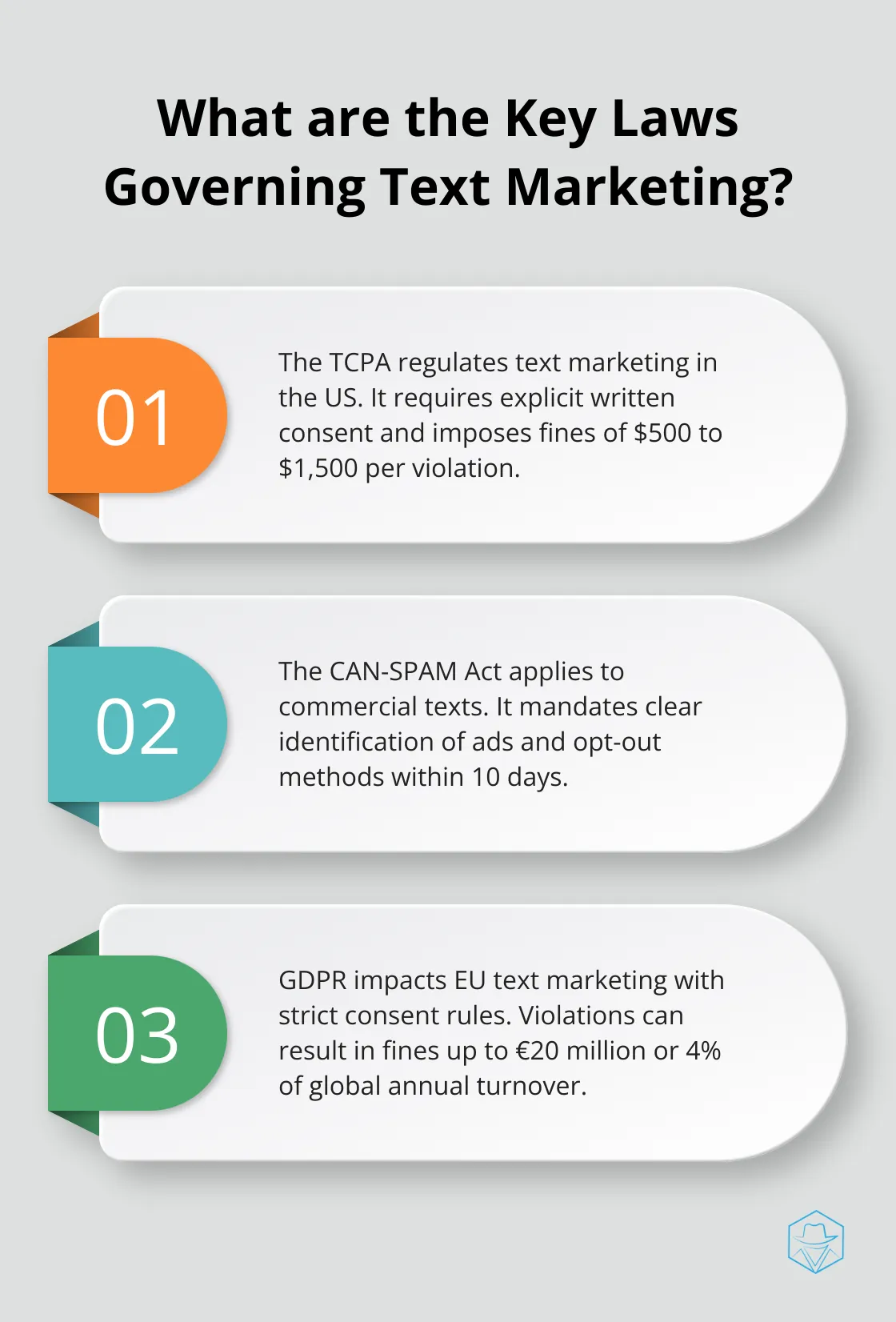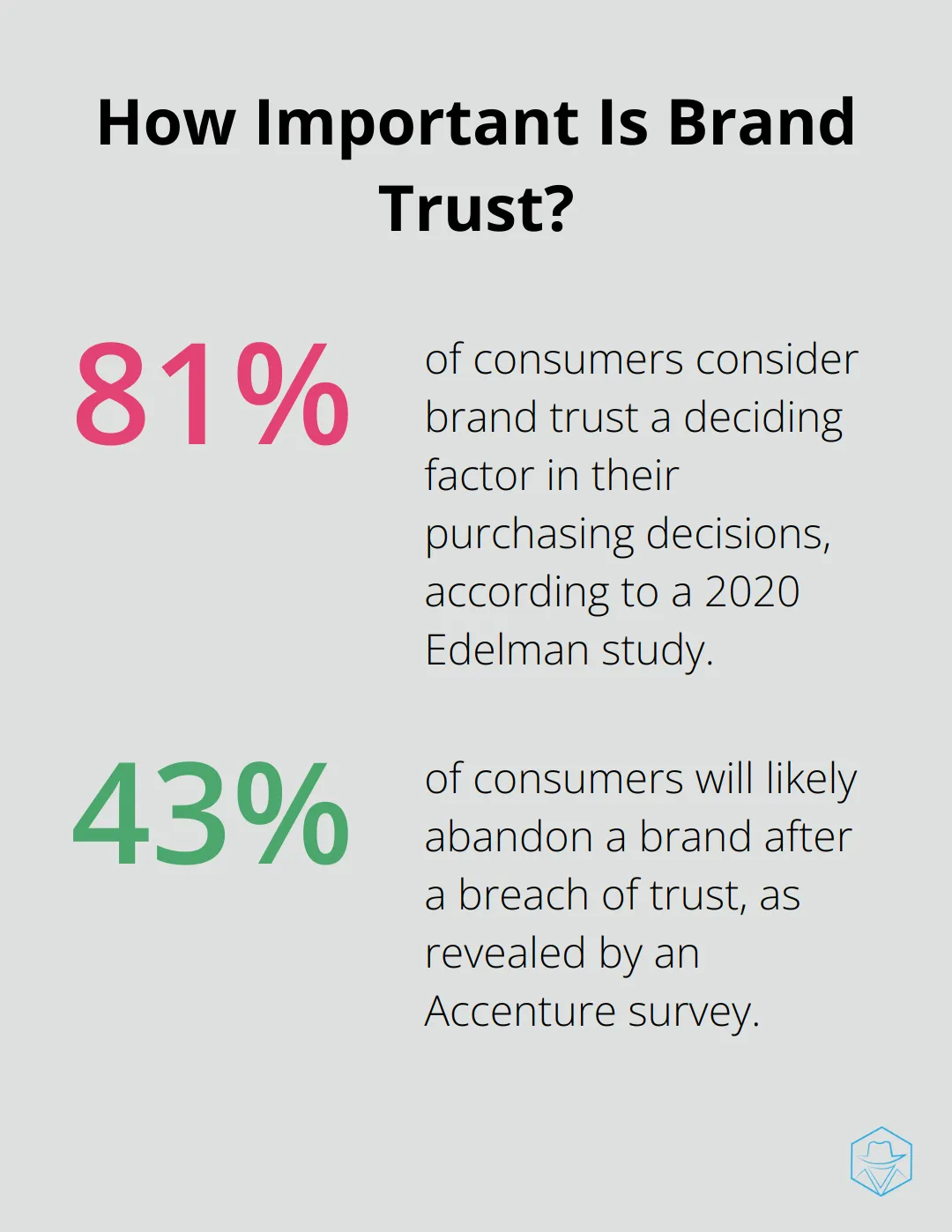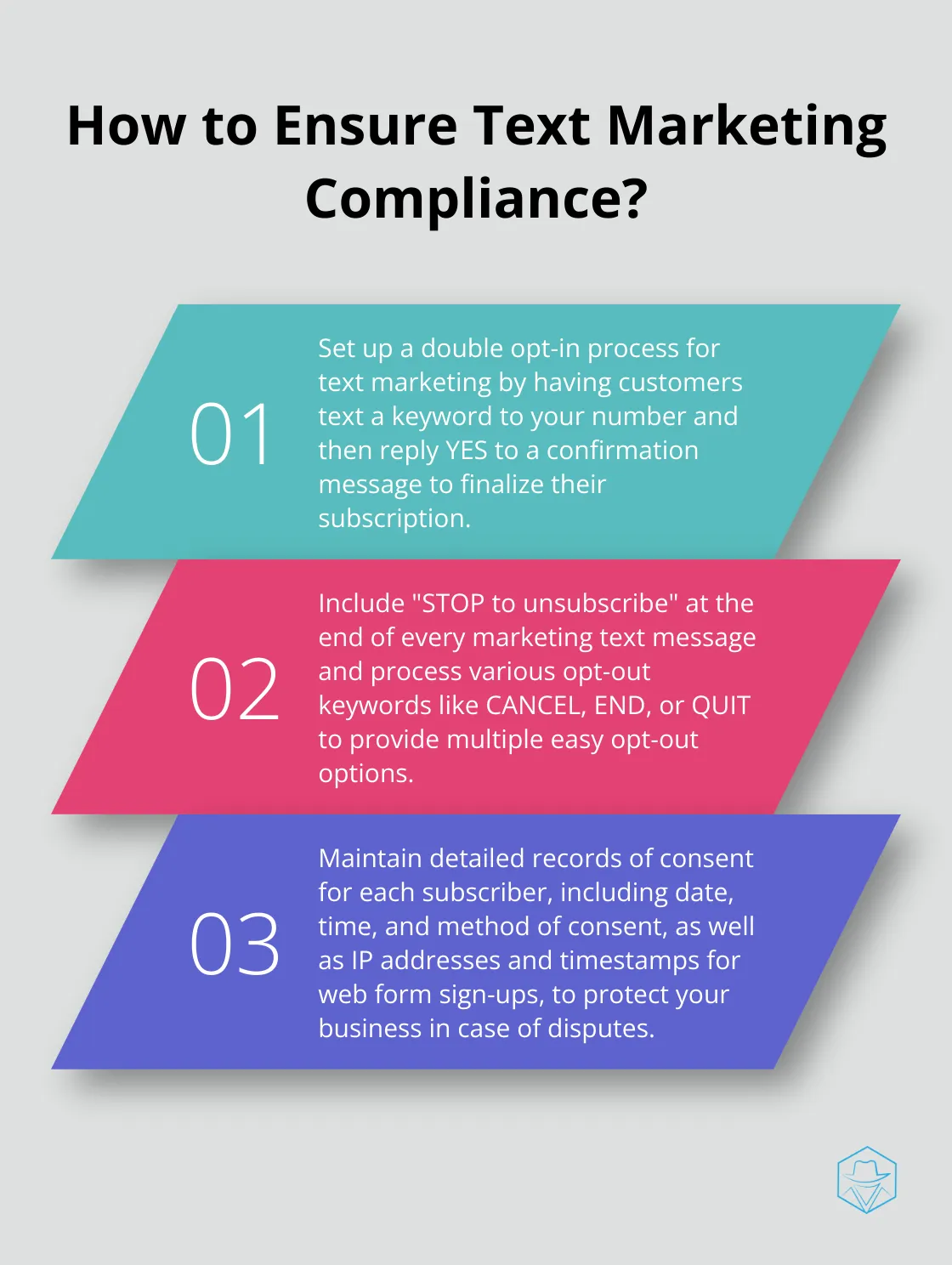Understanding Text Marketing Laws and Regulations

Text marketing laws are a critical aspect of modern business communication. At Drop Cowboy, we understand the importance of navigating these regulations to protect both businesses and consumers.
This guide will explore key laws governing text marketing, essential compliance requirements, and the consequences of non-adherence. By understanding and following these rules, businesses can harness the power of text marketing while maintaining legal and ethical standards.
What Laws Govern Text Marketing?
Text marketing laws form a complex web of regulations that businesses must navigate. Understanding these laws is essential for effective and compliant marketing strategies.
The Telephone Consumer Protection Act (TCPA)
The TCPA stands as the cornerstone of text marketing regulation in the United States. Enacted in 1991, it establishes strict rules for businesses sending marketing messages. The TCPA defines “unsolicited advertisement” as any material advertising the commercial availability or quality of any property, goods, or services. This act mandates explicit written consent from consumers before sending marketing texts. This consent must be clear, conspicuous, and specific to text marketing (not just a simple checkbox on a form).

The Federal Communications Commission enforces hefty penalties for TCPA violations. Fines range from $500 to $1,500 per message, which can quickly accumulate for businesses with large subscriber lists.
The CAN-SPAM Act
While the CAN-SPAM Act primarily focuses on email, it also applies to commercial text messages. This act requires businesses to:
- Clearly identify messages as advertisements
- Provide easy opt-out methods
- Honor opt-out requests within 10 business days
The Federal Trade Commission enforces this act, ensuring businesses respect consumer choices and maintain transparency in their marketing communications.
The General Data Protection Regulation (GDPR)
For businesses reaching customers in the European Union, the GDPR sets strict standards for data protection and privacy. Under the GDPR, businesses must obtain clear consent for data collection and processing, including for text marketing purposes.
Non-compliance with GDPR can result in severe financial penalties. Fines can reach up to €20 million or 4% of global annual turnover (whichever is higher), making compliance a top priority for businesses operating in or targeting EU markets.
State-Specific Regulations
Many U.S. states have enacted their own text marketing laws, often more stringent than federal regulations. For example:
- California’s Consumer Privacy Act (CCPA) gives consumers more control over their personal information.
- Florida recently passed a law requiring businesses to obtain written consent before sending marketing texts, with potential fines of $500 per violation.
These state-specific laws add another layer of complexity to text marketing compliance, requiring businesses to stay informed about regulations in each state where they operate.
Navigating this complex legal landscape requires diligence and expertise. While tools exist to help ensure compliance (such as consent management features and opt-out mechanisms), consulting with legal professionals remains crucial for full compliance with all applicable laws and regulations.
As we move forward, let’s explore the key requirements for compliant text marketing, which will help businesses implement these laws effectively in their marketing strategies.
How to Ensure Text Marketing Compliance
Text marketing compliance builds trust and respect with your audience. Adhering to best practices leads to more effective campaigns and stronger customer relationships.
Secure Explicit Consent
The foundation of compliant text marketing requires clear, unambiguous consent from recipients. Implement a double opt-in process:
- Have customers text a keyword to your short code or long number.
- Send a confirmation message asking them to reply YES to finalize their subscription.

This two-step process creates a clear record of consent and reduces the risk of accidental subscriptions.
Create a Bulletproof Opt-Out Process
Include a simple, straightforward way for recipients to opt out in every text message. Add “STOP to unsubscribe” at the end of each message. Process various opt-out keywords like CANCEL, END, or QUIT. Providing multiple opt-out options increases customer satisfaction and compliance.
Respect Frequency Limits
Restraint is key when sending marketing texts. Sending more than 4-6 messages per month can lead to increased opt-outs. Start with a lower frequency and increase based on engagement metrics. Be transparent about message frequency when customers sign up. Consider offering different subscription tiers (e.g., weekly vs. monthly updates).
Keep Meticulous Records
Maintain detailed records of consent to protect your business in case of disputes. Store the date, time, and method of consent for each subscriber. For web form sign-ups, capture IP addresses and timestamps. For keyword opt-ins, keep logs of the initial text and confirmation message. Make these records easily accessible and back them up regularly.
Stay Updated on Regulations
Laws and regulations evolve constantly. Review and update your text marketing procedures regularly to stay ahead of regulatory changes. This proactive approach helps maintain the trust of your audience and ensures ongoing compliance. SMS marketing laws in the US include TCPA, CTIA, and ADA.
As we move forward, it’s important to understand the consequences of non-compliance. The next section will explore the potential penalties and repercussions businesses face when they fail to adhere to text marketing laws and regulations.
What Happens When You Break Text Marketing Laws?
Financial Penalties Can Cripple Your Business
Non-compliance with text marketing laws results in severe financial consequences. The Telephone Consumer Protection Act (TCPA) imposes fines of $500 to $1,500 per violation. A campaign sent to 10,000 recipients without proper consent could lead to fines between $5 million and $15 million. In 2015, Caribbean Cruise Line paid a $76 million settlement for TCPA violations, illustrating the potential scale of these penalties.
Legal Battles Drain Resources
Businesses that violate text marketing laws often face costly legal battles. These lawsuits consume valuable time and resources, beyond just financial settlements. Jiffy Lube’s $47 million settlement in 2017 for alleged TCPA violations demonstrates how legal action impacts even established brands.
Reputation Damage Lasts
Non-compliance damages brand reputation. News of violations erodes consumer trust and attracts negative media coverage. A 2020 Edelman study found that 81% of consumers consider brand trust a deciding factor in their purchasing decisions. Rebuilding trust after non-compliant marketing practices takes significant time and effort.
Customer Exodus Leads to Revenue Loss
The most significant long-term consequence is customer loss. People who feel their privacy has been violated or preferences ignored will opt out of future communications and take their business elsewhere. An Accenture survey revealed that 43% of consumers will likely abandon a brand after a breach of trust. This exodus can lead to substantial revenue losses that outweigh any short-term gains from non-compliant marketing tactics.
Operational Disruptions Affect Business Continuity
Regulatory bodies may impose operational restrictions on businesses that repeatedly violate text marketing laws. These restrictions can include temporary or permanent bans on certain marketing activities, forcing companies to restructure their communication strategies. Such disruptions can significantly impact business continuity and growth prospects.

Final Thoughts
Text marketing laws form a critical aspect of modern business communication. Companies must stay informed about these regulations to protect themselves from fines, legal battles, and reputational damage. Compliance with text marketing laws offers numerous benefits, including a positive brand image, enhanced customer loyalty, and a foundation for sustainable growth.

The Federal Communications Commission (FCC) website, industry associations, and legal experts provide valuable resources for staying updated on text marketing laws. Businesses should consult these authoritative sources regularly to ensure their marketing practices remain compliant. Attending webinars, workshops, and conferences focused on mobile marketing regulations can also offer insights and networking opportunities.
Drop Cowboy offers tools and features designed to help businesses navigate the complex landscape of text marketing laws. Our platform supports consent management and automated opt-out processing, enabling companies to leverage the power of text marketing responsibly and effectively. Text marketing laws serve as guidelines for creating respectful, effective, and mutually beneficial communication with customers.
blog-dropcowboy-com
Related posts

March 28, 2025
Effective Marketing Automation Strategies for 2025
Explore top marketing automation strategies for 2025 and transform your business approach with data-driven insights and proven techniques.

February 28, 2025
How to Create a Winning Text Messaging Marketing Campaign
Boost engagement with expert tips on creating a winning text messaging campaign marketing strategy that drives results and increases customer interaction.

April 8, 2025
Best Marketing Automation Courses for Professionals
Explore top marketing automation courses for professionals and elevate your skills with essential tools and strategies for success.

April 14, 2025
How to Integrate CJ Dropshipping with Shopify
Integrate CJ Dropshipping with Shopify easily and boost your e-commerce success. Get practical tips and seamless solutions for your online store today.

March 18, 2025
Understanding Twilio Pricing: A Comprehensive Guide
Explore Twilio pricing to make informed decisions. Learn strategies to manage costs effectively and understand Twilio price structure in our guide.

April 3, 2025
Marketing Automation for Agencies: Boost Efficiency
Boost efficiency with marketing automation for agencies. Leverage tools and insights to save time, streamline tasks, and enhance client satisfaction.